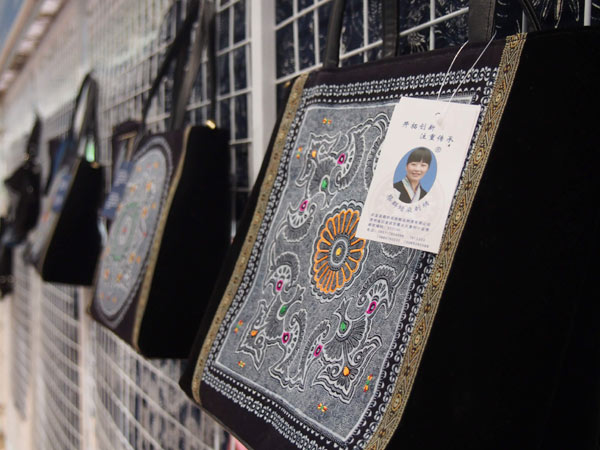Putting folk art skills to work
 |
|
Cai's workshop showcases batik handicrafts, which are favorites for tourists. Photo by Zheng Jun / For China Daily |
"The event was intended to help people like Cai to present their skills and help them realize their dreams," Long says. Launched in 2006, the competition and exhibition has become a famous annual event for the local cultural industry in Guizhou.
The competition has also attracted foreign folk artists. According to Long, more than 300 craftsmen from more than 60 counties participated this year's event.
A lot of local craftswomen were discovered in the competition. But in Long's mind, the local craftswomen like Cai encountered a common problem: the lack of marketing skills and capital to upgrade the scale of their business.
Therefore, at the initiative of Long, the SME bureau of Guzihou has established a special foundation for training the local women in managerial skills and helping them to start their own businesses.
With the prize money from the competition and the SME bureau, Cai started her own business selling batik artworks. Like any startup, the money did not just turn up automatically. Cai struggled at first, but little by little her artworks gained recognition in the local travel market.
"I didn't realize it was a business opportunity until someone was actually willing to pay for my works at the talent fair," Cai says. "More importantly, it boosted my confidence."
A tourist group from South Asia once visited Cai's workshop and praised her artwork highly. They bought a lot of products at high prices, and shortly after that, the same travel agency placed another order.
Cai was very happy to see her business growing, providing a brighter future for women like her.
"Because it is not only me, but also my sister in Guiyang and the girls in our village that are good at doing this too."
In 2009, with 80,000 yuan ($13,000) of initial funding, Cai and her husband established a company hiring local villagers to make batik and embroidery products.
Right now, Cai's Batik and Embroidery Company hires more than 60 local women during peak season. Prices for their products range from hundreds to thousands of yuan, and the annual output totals around 3 million yuan.
Earlier this year, Cai became a deputy to the National People's Congress.
"I was stunned and excited when I heard I had been elected," Cai says, "Then I realized that it means a lot of responsibilities."
In March this year, she made a proposal at the annual session of NPC on promoting industries rooted in ethnic cultures.
"People have realized the value of ethnic artworks, so ethnic groups should preserve our traditions and pass them on," Cai suggests. "By combining ethnic artworks with tourism, we can protect our traditions and provide more jobs at home to support the young."
Cai has a dream that one day women in her village will no longer need to work outside. "My sisters and I can sit together at home, singing folk songs while making batiks."
Xing Yi contributed to this story.






















